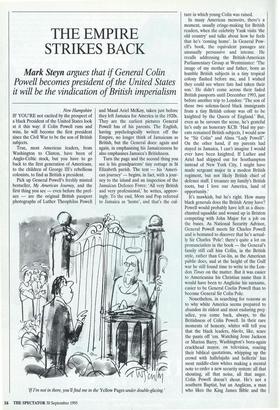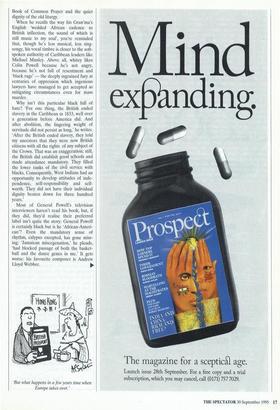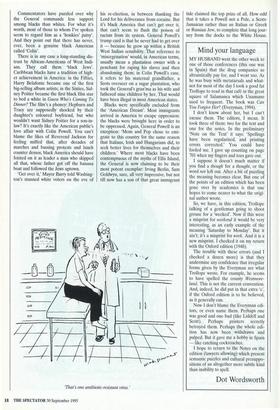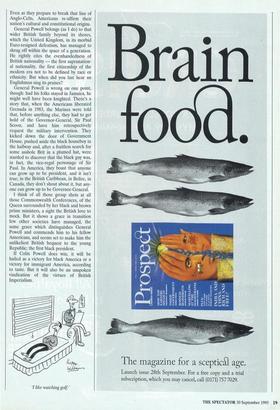THE EMPIRE STRIKES BACK
Mark Steyn argues that if General Colin
Powell becomes president of the United States it will be the vindication of British imperialism
New Hampshire IF YOU'RE not excited by the prospect of a black President of the United States look at it this way: if Colin Powell runs and wins, he will become the first president since the Civil War to be the son of British subjects.
True, most American leaders, from Washington to Clinton, have been of Anglo-Celtic stock, but you have to go back to the first generation of Americans, to the children of George III's rebellious colonists, to find as British a president.
Pick up General Powell's freshly minted bestseller, My American Journey, and the first thing you see — even before the pref- ace — are the original British passport photographs of Luther Theophilus Powell and Maud Ariel McKoy, taken just before they left Jamaica for America in the 1920s. They are the earliest pictures General Powell has of his parents. The English, having psychologically written off the Empire, no longer think of Jamaicans as British, but the General does: again and again, in emphasising his Jamaicanness he also emphasises Jamaica's Britishness.
Turn the page and the second thing you see is his grandparents' tiny cottage in St Elizabeth parish. The text — his 'Ameri- can journey' — begins, in fact, with a jour- ney to the island and an inspection of the Jamaican Defence Force: 'All very British and very professional,' he writes, approv- ingly. To the end, Mom and Pop referred to Jamaica as 'home', and that's the cul- `If I'm not in there, you'll find me in the Yellow Pages under double-glazing.' ture in which young Colin was raised.
In many American memoirs, there's a moment, usually cringe-making for British readers, when the celebrity Yank visits 'the old country' and talks about how he feels that he's 'coming home'. In General Pow- ell's book, the equivalent passages are unusually persuasive and intense. He recalls addressing the British-American Parliamentary Group at Westminster: 'The image of my mother and father, born as humble British subjects in a tiny tropical colony flashed before me, and I wished they could see where fate had taken their son.' He didn't come across their faded British passports until December 1993, just before another trip to London: 'The son of those two solemn-faced black immigrants from a tiny British colony was off to be knighted by the Queen of England.' But, even as he savours the scene, he's grateful he's only an honorary KCB: 'Had my par- ents remained British subjects, I would now be "Sir Colin" and Alma "Lady Powell". On the other hand, if my parents had stayed in Jamaica, I can't imagine I would ever have been knighted. If Luther and Ariel had shipped out for Southampton instead of New York City, I might have made sergeant major in a modest British regiment, but not likely British chief of defence staff. I treasure my family's British roots, but I love our America, land of opportunity.'
It's mawkish, but he's right. How many black generals does the British Army have? Powell would probably have left as a disen- chanted squaddie and wound up in Brixton competing with John Major for a job on the buses. As National Security Advisor, General Powell meets Sir Charles Powell and is bemused to discover that he's actual- ly Sir Charles 'Pole': there's quite a lot on pronunciation in the book — the General's family still call him Collin, in the British style, rather than Coe-lin, as the American public does, and at the height of the Gulf war he still found time to write to the Lon- don Times on the matter. But it was easier to Americanise his Christian name than it would have been to Anglicise his surname, easier to be General Coelin Powell than to become General Sir Colin Pole.
Nonetheless, in searching for reasons as to why white America seems prepared to abandon its oldest and most enduring prej- udice, you come back, always, to the Britishness of Colin Powell. In their rare moments of honesty, whites will tell you that the black leaders, blacks, like, scare the pants off 'em. Watching Jesse Jackson or Marion Barry, Washington's born-again crackhead mayor, on television, roaring their biblical quotations, whipping up the crowd with hallelujahs and hollerin' has most middle-class whites making a mental note to order a new security system: all that shouting, all that noise, all that anger. Colin Powell doesn't shout. He's not a southern Baptist, but an Anglican, a man who likes the King James Bible and the Book of Common Prayer and the quiet dignity of the old liturgy.
When he recalls the way his Gran'ma's English 'wedded African cadence to British inflection, the sound of which is still music to my soul', you're reminded that, though he's less musical, less sing- songy, his vocal timbre is closer to the soft- spoken authority of Caribbean leaders like Michael Manley. Above all, whitey likes Colin Powell because he's not angry, because he's not full of resentment and `black rage' — the deeply ingrained fury at centuries of oppression which ingenious lawyers have managed to get accepted as mitigating circumstances even for mass murder.
Why isn't this particular black full of hate? 'For one thing, the British ended slavery in the Caribbean in 1833, well over a generation before America did. And after abolition, the lingering weight of servitude did not persist as long,' he writes. `After the British ended slavery, they told my ancestors that they were now British citizens with all the rights of any subject of the Crown. That was an exaggeration; still, the British did establish good schools and made attendance mandatory. They filled the lower ranks of the civil service with blacks. Consequently, West Indians had an opportunity to develop attitudes of inde- pendence, self-responsibility and self- worth. They did not have their individual dignity beaten down for three hundred years.'
Most of General Powell's television interviewers haven't read his book, but, if they did, they'd realise their preferred label isn't quite the story: General Powell is certainly black but is he 'African-Ameri- can'? Even the mandatory sense of rhythm, calypso excepted, has gone miss- ing: 'Jamaican miscegenation,' he pleads, `had blocked passage of both the basket- ball and the dance genes in me.' It gets worse: his favourite composer is Andrew Lloyd Webber. 110' But what happens in a few years time when Europe takes over ' Commentators have puzzled over why the General commands less support among blacks than whites. For what it's worth, most of those to whom I've spoken seem to regard him as a 'honkies' patsy'. And they point out that there has never, ever, been a genuine black American called 'Colin'.
There is in any case a long-standing dis- trust by African-Americans of West Indi- ans. They call them 'black Jews'. Caribbean blacks have a tradition of high- er achievement in America: in the Fifties, Harry Belafonte became one of the first big-selling album artists; in the Sixties, Sid- ney Poitier became the first black film star to bed a white in Guess Who's Coming To Dinner? The film's a phoney: Hepburn and Tracy are supposedly shocked by their daughter's coloured boyfriend, but who wouldn't want Sidney Poitier for a son-in- law? It's exactly like the American public's love affair with Colin Powell. You can't blame the likes of Reverend Jackson for feeling miffed that, after decades of marches and bussing protests and lunch counter demos, black America should have foisted on it as leader a man who skipped all that, whose father got off the banana boat and followed the Jews uptown.
`Get over it,' Mayor Barry told Washing- ton's stunned white voters on the eve of his re-election, in between thanking the Lord for his deliverance from cocaine. But it's black America that can't get over it, that can't seem to flush the poison of racism from its system. General Powell's trump card is that he never had to get over it — because he grew up within a British West Indian sensibility. That reference to `miscegenation' would, in American terms, usually mean a plantation owner with a penchant for raping his slaves and then abandoning them; in Colin Powell's case, it refers to his maternal grandfather, a Scots overseer on a sugar plantation, who took the General's gran'ma as his wife and fathered nine children by her. That would have been illegal in most American states.
Blacks were specifically excluded from the 'American Dream'. Most immigrants arrived in America to escape oppression: the blacks were brought here in order to be oppressed. Again, General Powell is an exception: 'Mom and Pop chose to emi- grate to this country for the same reason that Italians, Irish and Hungarians did, to seek better lives for themselves and their children.' Where most blacks have been contemptuous of the myths of Ellis Island, the General is now claiming to be their most potent exemplar: Irving Berlin, Sam Goldwyn, sure, all very impressive, but not till now has a son of that great immigrant `That's one antibiotic-resistant virus.' tide claimed the top prize of all. How odd that it takes a Powell not a Pole, a Scots- Jamaican rather than an Italian or Greek or Russian Jew, to complete that long jour- ney from the docks to the White House. Even as they prepare to break that line of Anglo-Celts, Americans re-affirm their nation's cultural and constitutional origins.
General Powell belongs (as I do) to that wider British 'family beyond its shores, which the United Kingdom, in its morbid Euro-resigned defeatism, has managed to shrug off within the space of a generation. He rightly cites the evenhandedness of British nationality — the first supranation- al nationality, the first citizenship of the modern era not to be defined by race or ethnicity. But when did you last hear an Englishman sing its praises?
General Powell is wrong on one point, though: had his folks stayed in Jamaica, he might well have been knighted. There's a story that, when the Americans liberated Grenada in 1983, the Marines were told that, before anything else, they had to get hold of the Governor-General, Sir Paul Scoon, and have him retrospectively request the military intervention. They kicked down the door of Government House, pushed aside the black houseboy in the hallway and, after a fruitless search for some asshole Brit in a plumed hat, were startled to discover that the black guy was, in fact, the vice-regal personage of Sir Paul. In America, they boast that anyone can grow up to be president, and it isn't true; in the British Caribbean, in Belize, in Canada, they don't shout about it, but any- one can grow up to be Governor-General.
I think of all those group shots at all those Commonwealth Conferences, of the Queen surrounded by her black and brown prime ministers, a sight the British love to mock. But it shows a grace in transition few other societies have managed, the same grace which distinguishes General Powell and commends him to his fellow Americans, and seems set to make him the unlikeliest British bequest to the young Republic; the first black president.
If Cohn Powell does win, it will be hailed as a victory for black America or a victory for immigrant America, according to taste. But it will also be an unspoken vindication of the virtues of British Imperialism.
`I like watching golf'





































































 Previous page
Previous page